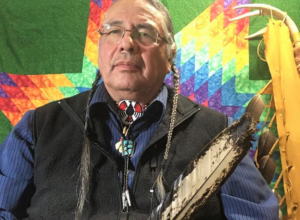Former Chippewas of the Thames First Nation Chief accepts Indigenous Knowledge Keeper position at University of Waterloo

By Sam Laskaris
KITCHENER-WATERLOO – Myeengun Henry is still doing his part to further reconciliation.
But Henry, a former chief for the Chippewas of the Thames First Nation, is no longer doing so at Conestoga College in Kitchener, Ont. Henry had spent 13 years at Conestoga working in the college’s Indigenous services office, being a voice on Indigenous issues and also providing support to both students and faculty.
Henry was the manager of Conestoga’s Indigenous services and also a professor at the college, but he left those positions in February to accept a newly created role at the nearby University of Waterloo. He’s now working as the university’s Indigenous Knowledge Keeper.
Henry said his dissatisfaction with Conestoga stemmed from the fact the college’s five-year strategic plan released last summer did not include any mention of Indigenous issues.
“All the time I worked there, I tried to promote Indigenous initiatives,” Henry said of his time at Conestoga.
Henry said Conestoga officials had also failed to include any mention of Indigenous issues during their previous strategic plan which had been released five years earlier, in 2016. Henry said he brought up his concerns at the time with the college. That’s why he was upset to see history repeat itself with Conestoga’s latest strategic plan.
“When it was launched, we were not included again,” said Henry.
Once again, Henry said he raised his concerns with college officials.
“I feel like I have embarrassed them a bit by pointing this out,” he said. “I feel like they dropped the ball a bit.”
Henry added he was pleased to see Conestoga’s student union take some action. It included a position for an Indigenous student on its board of directors. The student union also added a position for a vice-president of Indigenous services in its office.
Conestoga officials offered up a statement on their support of Indigenous issues.
It read, partly as follows:
“The college has long been committed to education, research and outreach initiatives specifically focused on supporting Indigenous students, sharing traditional knowledge and celebrating Indigenous culture.”
The statement added the college has indeed taken Indigenous issues seriously, encouraging inclusivity among Indigenous students and staff.
“It’s a long journey, and far from complete, but we have made significant progress over the last few years, adding Indigenous studies courses and language programs, creating curriculum and faculty training programs to enhance understanding of Indigenous culture and issues, creating new and expanded Indigenous services offices on our campuses, hiring additional Indigenous faculty and staff, and hosting Indigenous-focused events that build broader knowledge and understanding within our college and across the community.”
Besides his current University of Waterloo duties, Henry, who is 62, is now in his fifth term as serving as a councillor for his community of Chippewas of the Thames First Nation.
Henry began his new position at the University of Waterloo on Feb. 21. He stressed creating Indigenous initiatives and furthering the school’s reconciliation efforts will not be an overnight position.
“It’s going to take some strategy,” he said. “It’s going to take some time.”

